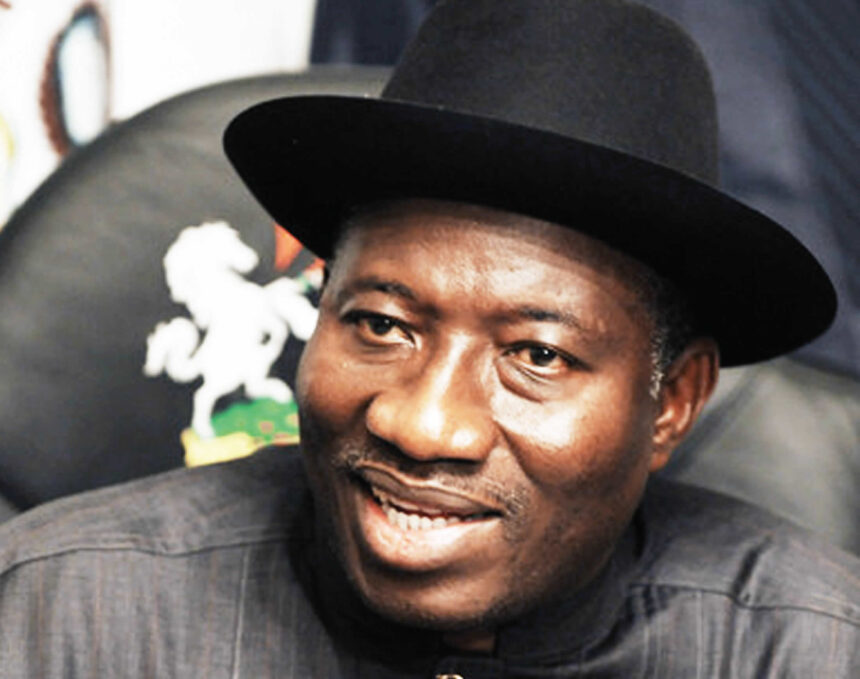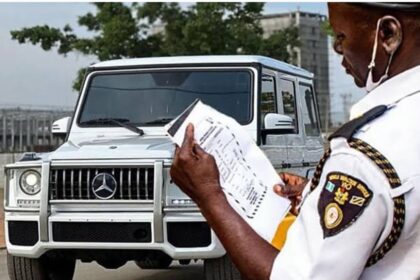Fresh attempts have been launched by a coalition of forces across the country to drag former President, Dr Goodluck Jonathan to run in 2027.
This is coming amid the frenzied efforts by various power blocs to reposition their camps in good stead ahead of the general election.
The mobilization drive, which is in an embryonic stage, is principally under the aegis of Jonathan Support Group. …CONTINUE READING


The rising wave of realignment by politicians and groups took a dizzying height following last Wednesday adoption of the African Democratic congress (ADC) by some chieftains of the Peoples Democratic Party (PDP) and the All Progressives Congress (APC) as a preferred choice to field candidates for the next general election.
Jonathan lost his second-term bid to former President Buhari in the 2015 presidential election.
Amidst the debate on whether Jonathan was eligible to run again or not, having taken the oath of office twice as president, the Federal High Court in Bayelsa had ruled in 2022 that he could still contest the presidential election.
The presiding judge, Justice Dashen, who gave the judgement, held that the former President’s right could not be stopped by any retroactive law.
He recalled that the 2007 election produced the late Umaru Musa Yar’Adua as president and not Goodluck Ebele Jonathan; stressing that Section 137 could not have a retroactive effect to stop him from contesting for presidency.
Justice Dashen ruled that there was no presidential election conducted in the country in 2010 and that Goodluck Ebele Jonathan could not be deemed to have been sworn into the office of the president that year.
The belief by the pro-Jonathan movement is that the former president, who conceded defeat to former President Muhammadu Buhari 10 years ago, still has the pedigree and goodwill among the political elite and grassroots, who they noted placed premium on national stability while in office.
Many other pressure groups are also said to be involved in intense meetings and consultations, as well as awareness tours to feel public in all the states and the Federal Capital Territory (FCT), Abuja.
Top on their lobbying strategy is what they described as Jonathan’s record as a unifier and a “leader who sacrificed personal ambition to protect Nigeria’s democracy.”
The director general of the group, Mr Abdullahi Dambatta, who shed light on the campaign in spite of the fact that the general election is about two years ahead expressed the hope that the former president would hearken to the call for him to run again.
He said: “We urge former President Goodluck Jonathan to consider the clarion call by Nigerians and step forward as a candidate who can unite our country and lead us towards a brighter future.
“As the nation prepares for the 2027 elections, the Jonathan Support Group believes that now is the time for all stakeholders to come together and support a candidate who can genuinely represent the interests of all Nigerians
“We urge former President Goodluck Jonathan to consider this call and to step forward as a candidate who can unite our country and lead us towards a brighter future.
“This appeal comes in light of the numerous challenges currently facing Nigeria, including economic hardship, insecurity, unemployment, and rampant banditry.”
Dambatta said there is an urgent need for a leader who embodies integrity, inclusivity, and a commitment to national unity. Nigerians need credible journalism. Help us report it.
“Nigeria is currently at crossroads. We are grappling with significant issues that threaten our stability and progress. We need a leader who can bring all Nigerians together, regardless of their background.
“Former President Jonathan during his tenure demonstrated a commitment to democratic values and governance that prioritised the welfare of all citizens.
“Jonathan Support Group believes that former President Goodluck Ebele Jonathan has the vision and experience necessary to lead Nigeria.
“His leadership style is one that fosters inclusivity and economic advancement, which is exactly what our nation needs at this critical juncture.
“Under Jonathan’s leadership, we can work towards restoring Nigeria’s lost glory on the international stage and within our own borders,” he stated.
Other figures reportedly active in the coalition of support groups include some former Northern governors who had previously supported him in 2011, a handful of serving National Assembly members, and youth activists who argue that a return to Jonathan could stabilise national politics at a time of deepening economic hardship and rising insecurity.
Supporters of the movement argue that the former president’s return could help “heal the nation’s divisions,” pointing to increasing ethnic and religious polarization, economic hardship, and widespread disillusionment with the current political class.
“There is also a pragmatic angle: some Northern politicians reportedly see Jonathan as a bridge figure that, having served only one full term, remains eligible for a single term in office. This, in theory, would create space for a North-South power rotation in 2031 without a prolonged stay in power by the South,” a political analyst, Alhaji Aliyu Dandume stated.
The move could reshape existing alignments. Jonathan is formally a member of the PDP, but there have been persistent rumours about a new coalition party.
“Our expectation is that the Coalition adopts Jonathan as its candidate. He stands a better chance to defeat the incumbent President, Bola Ahmed Tinubu, at the polls than any of the aspirants due to his acceptability by Nigerians irrespective of region, tribe or religion”, another analyst, Mahmood Shema, said.
He explained that for Northern politicians hoping to preserve the long-standing informal zoning arrangement—where power rotates between North and South—this scenario could be appealing: Jonathan’s presidency would, by definition, end in 2031, allowing the North to legitimately reclaim the slot thereafter.
Supporters also underscored Jonathan’s perceived inclusive governance style, relative peace during much of his tenure (excluding the Boko Haram insurgency’s peak years), and his statesmanlike decision to accept defeat in 2015, which many credit with preventing large-scale post-election violence.
While Jonathan himself remains silent, the Northern Youth Alliance for Jonathan has launched a series of town hall meetings in states such as Kano, Kaduna, and Katsina, aimed at selling the idea to the next generation of voters.
Similarly, the Jonathan Solidarity Forum is also believed to have been involved in engagement with some southern political actors to reassure them that the push is not an attempt by the North to dominate but rather a pragmatic move to restore political equilibrium.




